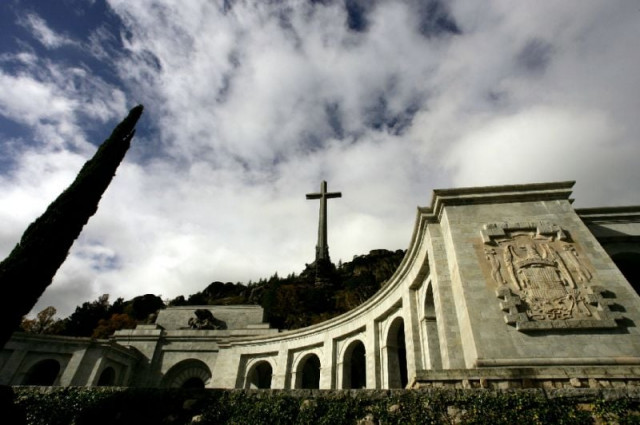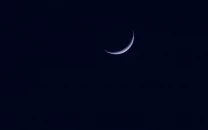Spain's new government to remove Franco's remains from mausoleum
Socialist party wants area transformed into 'place of reconciliation for Spaniards, not of apology for dictatorship'

The massive Valley of the Fallen mausoleum near Madrid, where the remains of former Spanish dictator Franco rest. PHOTO: AFP
"We don't have a date yet, but the government will do it," Prime Minister Pedro Sanchez said late Monday during his first television interview since being sworn in on June 2 after toppling his conservative predecessor Mariano Rajoy in a confidence vote.
He recalled that a non-binding motion approved last year in parliament called for Franco's remains to be exhumed from the massive Valley of the Fallen mausoleum some 50 kilometres (30 miles) northwest of Madrid and the site turned into a "memorial of the victims of fascism".
Another Spanish king's speech in troubled times
"Spain can't allow symbols that divide Spaniards. Something that is unimaginable in Germany or Italy, countries that also suffered fascist dictatorships, should also not be imaginable in our country," Sanchez added.
Earlier on Monday Socialist party spokesperson Oscar Puente said the mausoleum should be transformed into a "place of reconciliation, of memory, for all Spaniards, and not of apology for the dictatorship."
Franco ruled Spain with an iron fist from the end of the country's 1936-39 civil war until his death in 1975, when he was buried inside a basilica drilled into the side of a mountain at the Valley of the Fallen, one of Europe's largest mass graves.
Built by Franco's regime between 1941 and 1959 - in part by the forced labour of political prisoners - in the granite mountains of the Sierra de Guadarrama, the monument holds the remains of more than 30,000 dead from both sides of the civil war, which was triggered by Franco's rebellion against an elected Republican government.
Franco, whose Nationalist forces defeated the Republicans in the war, dedicated the site to "all the fallen" of the conflict in an attempt at reconciliation, but only two graves are marked - those of Franco and Jose Antonio Primo de Rivera, the founder of the far-right Falangist party which supported Franco.
Catalan parliament votes to split from Spain
The mausoleum features a 150-metre-tall (500-feet) stone cross and other symbols of Franco's National-Catholic ideology, and is seen by many as a relic of the dictatorship. Fresh flowers can still be found on top of Franco's and Rivera's tombs.
Many on the left are repulsed by its existence, comparing it to a monument glorifying Hitler.
Others, often on the right, insist the Valley of the Fallen is an innocuous piece of history whose critics have twisted its true meaning.
The Socialists included the removal of Franco and Rivera's remains in a proposed law they presented in December 2017 when they were in opposition.
The proposed law also called for the creation of a truth commission and for politically motivated court rulings taken during Franco's dictatorship to be annulled.
Sanchez unveiled it at a highly symbolic spot near the eastern port of Valencia where more than 2,000 Republican supporters are believed to have been shot dead by Franco's forces.
"If we ignored an uncomfortable past, we can't build a comfortable future," he said at the time.
Rajoy's Popular Party, a successor to the Popular Alliance founded in 1976 by former Franco ministers, accuses the Socialists of needlessly raking over the past. It opposed attempts to exhume Franco's remains when it was in power.
"The Socialist party has accustomed us to leading these cultural battles" which "do nothing to help coexistence," said Andrea Levy, a top Popular Part official.
Centrist party Ciudadanos said it was open to moving Franco's remains, while anti-establishment party Podemos, which supported the no-confidence motion that brought the Socialists to power, hailed the initiative.
Top Podemos official Pablo Echenique said it was wrong for the remains of a "genocidal dictator" to rest "in a giant mausoleum while there are tens of thousands of dead in mass graves".
He was referring to the estimated 114,000 bodies of the victims of Franco's forces during the civil war and the first years of his rule that are still in unmarked graves across Spain.



















COMMENTS
Comments are moderated and generally will be posted if they are on-topic and not abusive.
For more information, please see our Comments FAQ